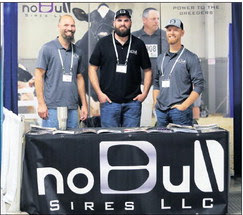 |
From left, Ben Masemore, Ethan Wentworth and Rusty Herr.
Wentworth and Herr are currently in jail afterfacing accusations
of practicing veterinary medicine without a license.
(Photo provided by Ben Masemore)
(Editor's Note: This action taken by Pennsylvania prosecutors should concern goat producers who routinely use ultrasound to determine pregnancy. They can potentially be charged with illegally practicing veterinary medicine. This article is reprinted from the April 20 e-edition of Lancaster Farming (lancasterfarming.com)
By Tom Venesky
Two Pennsylvania men operating a dairy reproduction service are in prison following a complaint of practicing veterinary medicine without a license. Rusty Herr, 43, was booked at the Lancaster County Prison on April 11, while Ethan Wentworth, 33, was sent to the York
County Prison on April 10. Herr and Wentworth are listed as operating partners of Airville-based NoBull Solutions LLC.
Veterinarians have made multiple complaints about “the illegal practice of veterinary medicine by unlicensed individuals employed by NoBull Solutions,” according to a complaint filed with the Department of State in 2020 by thePennsylvania Veterinary Medicine Association.
The complaint alleges that people employed by NoBull were doing ultrasounds and making diagnoses. The document cites reports from veterinary association members and posts on Facebook.
In 2010, Herr was ordered to pay a $3,500 fine and to cease and desist from the unlicensed practice of veterinary medicine. Wentworth got a cease-and-desist order in 2018 along with a $3,000 civil penalty. The 2020 complaint alleges that Herr and Wentworth continued to practice veterinary medicine without a license and hired others to do the same. According to dairy farmer Ben Masemore, who is acting as a spokesman for Herr and Wentworth, both men were advised by their former attorneys not to pay the fines or appear in court because they don’t see an issue with using ultrasound for reproductive services such as pregnancy checks. He said they are both serving 30-day sentences without bail.
Masemore, who is involved with Herr and Wentworth in an unrelated business, said the law governing veterinary practice is vague and doesn’t cover ultrasounding, which is a common practice on dairy farms today.
“I know of up to 20 individuals in the state using ultrasound for reproduction. Anyone can purchase one, as they are readily available today,” he said. Numerous dairy farmers in Lancaster, Lebanon, York and surrounding counties depended on the services offered by NoBull, and the operators’ detention has caused problems for those farms, Masemore said.
The Pennsylvania Veterinary Medicine Association deferred comment to the Department of State, which said it couldn’t confirm or deny an investigation due to confidentiality statutes. A search of Pennsylvania Licensing System Verification didn’t turn up any veterinary license records for Herr and Wentworth.
“The department reviews every potential practice act violation of which it becomes aware, whether that is through a complaint filed directly to the department, a notification from local law enforcement, or through media reports,” State Department spokeswoman Amy Gulli said in an email.
If the State Board of Veterinary Medicine is going to interpret ultrasounding as practicing medicine, the law needs to be changed, Masemore said.
“This really affects every single one of us (dairy farmers). With the economic situation of Pennsylvania dairy, we need all the help we can get,” Masemore said. “It’s not easy out there, and people need to change the way that dairy in Pennsylvania is being treated. We’re being tarred and feathered economically,and the burden keeps getting worse.” A recording on the phone line listed for NoBull Solutions said that due to the legal situation and staff shortages, the business is not scheduling herd checks or horse services before May 20.
The message urges callers to contact the state veterinary board and local lawmakers to express their concerns about the situation. A “NoBull Solutions LLC Defense Fund” has been set up for the men on GiveSendGo and at local banks. For more information, call 717-887-6465.
